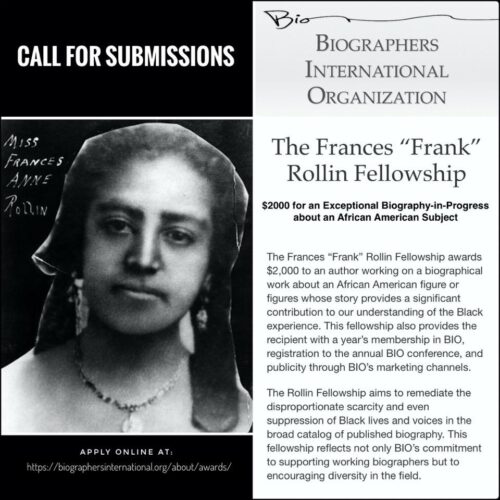Awards
Gayatri Patnaik to Receive Editorial Excellence Award
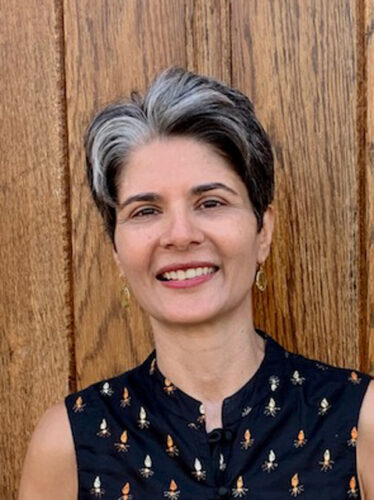
At Beacon Press, Gayatri Patnaik co-edited The King Legacy series, a partnership between Beacon and Martin Luther King Jr.’s estate.
Gayatri Patnaik will receive BIO’s 2020 Editorial Excellence Award on Monday evening, November 9, at an online event featuring three of her authors: Imani Perry, Marcus Rediker, and Jeanne Theoharis, along with literary agent Tanya McKinnon.
Patnaik is Associate Director and Editorial Director of Beacon Press, where for 18 years she has edited and published many books on race, ethnicity, and immigration. A native of India who emigrated with her family to the United States as a child, she has focused on African American history, creating Beacon’s “ReVisioning American History” series and its “Queer Action / Queer Ideas” series.
Kai Bird, chair of BIO’s Award Committee, with Tim Duggan, Peniel Joseph, Kitty Kelley, and Megan Marshall, praised Patnaik for her work as “a very gutsy, courageous editor who has taken on some high-risk, controversial biographies and published so many outstanding authors.”
Imani Perry, the Hughes-Rogers Professor of African American Studies at Princeton University, is the author of Looking for Lorraine: The Radical Life of Lorraine Hansbury, winner of the PEN/Jacqueline Bograd Weld Award for Biography, the Lambda Literary Award for LGBTQ Nonfiction, and other awards.
Marcus Rediker, Distinguished Professor of History at the University of Pittsburgh, is the award-winning author of numerous books including The Fearless Benjamin Lay: The Quaker Dwarf who became the First Revolutionary Abolitionist.
Jeanne Theoharis, Distinguished Professor of Political Science at Brooklyn College of the City University of New York, is the author of The Rebellious Life of Mrs. Rosa Parks, winner of the NAACP Image Award and the Letitia Woods Brown Award of the Association of Black Women Historians.
Tanya McKinnon, founder and principal of McKinnon Literary, represents New York Times bestselling and award-winning nonfiction that amplifies progressive voices, as well as fiction, children’s books, and graphic novels.
BIO’s Editorial Excellence Award is presented annually to an outstanding editor from nominations submitted by BIO members. Past recipients are Tim Duggan, Robert Gottlieb, Jonathan Segal, Ileene Smith, Nan A. Talese, and Robert Weil.
Register for free tickets on Eventbrite and receive a link to join the event on Zoom on Monday, November 9, at 7 p.m. ET.
BIO Announces New Fellowship in Support of African American Lives
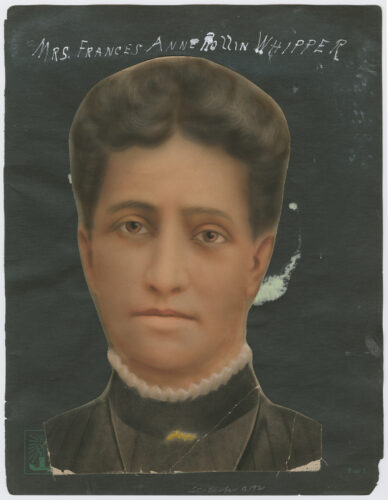
Frances Rollin kept one of the earliest known diaries written by a southern Black woman. Her 1868 diary covers the publication of her biography of Martin R. Delany; a transcript of it is available online through the Smithsonian Institution. Click the image to go to the diary.
By Eric K. Washington, with Sarah Kilborne, Anne Boyd Rioux, and Sonja Williams
BIO is pleased to announce the new Frances “Frank” Rollin Fellowship for African American Biography. The Rollin Fellowship will award $2,000 to an author working on a biographical work about an African American figure (or figures) whose story provides a significant contribution to our understanding of the Black experience. The deadline for applications is February 1, 2021.
The Rollin Fellowship is named for the first known African American biographer—Frances “Frank” Rollin—and aims to remediate the disproportionate scarcity and even suppression of Black lives and voices in the broad catalog of published biography. At its September meeting, the Board of Directors unanimously approved the new fellowship, which reinforces BIO’s mission to encourage diversity in the field.
The fellowship’s namesake, Frances Anne Rollin Whipper (1845–1901)—who published as “Frank A. Rollin”—was a 19th-century author and activist. Her groundbreaking 1868 biography, Life and Public Services of Martin R. Delany, presented the life of a Black abolitionist journalist, physician, and Union Army officer. The Black press recognized the significance of the precedent Rollin set and called for more biographies of African Americans. This fellowship seeks to carry forth that call into the 21st century.
The Rollin Fellowship aims to foster the development of biographical works that encourage deeper insight into the complexity of race relations at the bedrock of American history. This fellowship will support any biography that highlights the Black experience in the Americas, and that is set within the vast time period between (and even before) 1619 and the present. It will support any aspect of African American inhabitancy, dispersion, immigration, or emigration. It will support biographies of Black lives often marginalized by gender, gender-orientation, sexuality, or disability.
Please spread the word about the Rollin Fellowship through your networks. For more information, please visit the Rollin Fellowship page on BIO’s website.
Eric K. Washington chairs BIO’s ad hoc Black Lives Matter Committee, on which Anne Boyd Rioux, Sarah Kilborne, and Sonja Williams also serve.
On Being “Frank”
By Eric K. Washington

Carole Ione’s work includes the opera The Nubian Word for Flowers, a co-creation with Pauline Oliveros that debuted in 2017.
One could say Carole Ione, also known professionally as IONE—a playwright, poet, diarist, and frequent co-creator with her longtime spouse, the late composer Pauline Oliveros —has grown accustomed to long waits. As chair of BIO’s Black Lives Matter Committee, I recently had the privilege of informing Ione that Frances Anne Rollin Whipper (1845–1901) would be the namesake of a new $2,000 fellowship next spring, to be offered for a biography-in-progress of an African American figure. Whipper claimed the distinction of being the first known African American biographer in 1868, when just before her marriage she published—under the pen name “Frank A. Rollin”—Life and Public Services of Martin R. Delany, about a Black abolitionist journalist, physician, and Union Army officer.
Ione had played a key role in reviving her predecessor’s nearly forgotten merit. In 1991, 90 years after Whipper’s death, Ione traversed uncharted bloodlines to an unknown great-grandmother—her book, Pride of Family: Four Generations of American Women of Color, was at once biography and memoir. (The book was edited by Ileene Smith, winner of BIO’s 2019 Editorial Excellence Award.) Ione’s personally, long-awaited book received good reviews, yet nevertheless seemed ill-timed, for her publisher (Summit Books) went out of business right after its release. But nearly three decades later, Carole Ione appears no less heartened for good news.
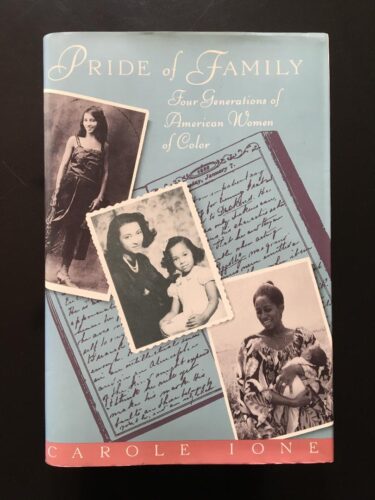
Carole Ione’s Pride of Family: Four Generations of American Women of Color was a New York Times Notable Book.
Eric K. Washington: What was your thought when you heard your great-grandmother, Frances Rollin, was to be the namesake of a biography fellowship?
Carole Ione: Oh, it really was like a dream coming true through centuries. When I was working on my book I was obsessed with her. There’s this line in her diary in which she said she wanted to “make her mark in literature,” but many things prevented that from happening fully. She was acclaimed for the book when it came out, and then she had much other writing that was interrupted by the difficulties of the Reconstruction Congress. Her political activism remained intact, and she gave her all [to] raising kids in Washington. Yet I’ve always felt the sort of longing in her remark. And when I heard the news, I felt that it had happened.
EKW: Frances Rollin was a remarkable woman, with whom you had much in common as a writer and a diarist. Yet somehow you didn’t become acquainted with her until adulthood?
CI: Yes, my mother had mentioned that there was someone, but it was very vague. I was a freelance writer in the 70s, scrambling for all kinds of stories. Ms. magazine was happening, and I remembered something about the women in my family . . . something about a diary. My mother had sent the diary to Dorothy Sterling [another writer, then working on We Are Your Sisters: Black Women in the Nineteenth Century, W. W. Norton, 1984], who sent me the diary.
So I discovered my great-grandmother [Frances Rollin, who married lawyer William J. Whipper] as an adult with children. I had a good education, but there were no African American studies at the time. When I opened the book, I said “how could I have not known about this woman my whole life?” So part of my research was in finding out, you know, why the women in my family were not forthcoming about their own lives.
The men in the family were quite renowned in their way—William S. Whipper [noted abolitionist, not to be confused with Frances’s husband, William J. Whipper], and my grandfather, Leigh Whipper [Frances’s son, the legendary stage and screen actor] . . . but when I tried to find out about the women, [the family] had very little to say. So as I began to write I looked toward this woman, Frances Anne Rollin, as the mother who would share with me all of her secrets and her needs.
EKW: Did the nonfiction genres of biography or memoir particularly interest you prior to learning of your great-grandmother’s contribution to the field?
CI: Well, I was always interested in personal writing and personal life stories. Colette, for example, was my muse from early childhood, because my mother had a book of hers, and what mother had on her shelf I gobbled up. They were not African American stories, but they were biographies. So, yes, I was very interested.
EKW: Tell us about Frances’s nom de plume, “Frank.” Literary history abounds with instances of women writers masking their gender behind male pen names. Was this her story?
CI: You know, when I was discovering her, I was involved with the early feminist movement in a very deep way. I really was incensed that she had to publish under a man’s name. But as I deepened into my research, I found evidence that the family called her “Frank,” her nickname. Frank A. Rollin was a part of who she really was. I was relieved to find that out, and from then on, she became Frank to me, and I always wrote about her in that way.
EKW: What do you see as the lasting legacy of a 19th-century Black woman first-time biographer on a generation of 21st-century biographers?
CI: I think her perseverance in writing about a very important subject—there have been other biographies of Martin Delany, but her book is the primary source of information. And the concept of her money drying up, which happens to so many writers, then persevering through the harsh times of the political climate. Also, I think her position . . .
[Here Ione evokes her great-grandmother’s rectitude by citing a diary entry on George Washington’s birthday in 1868.]
If things continue as they are, there will be but little country to celebrate it. For myself I am no enthusiast over patriotic celebrations as I am counted out of the body politic.
CI: “Frank” was acutely aware of the worldly events around her, and of taking a stand toward better elements of life for writers and for people of color and for women.
It seems that what Ione once felt to be her great-grandmother’s unfulfilled longing to “make her mark in literature” might now be a source of inspiration. She’s thrilled by the news that next year some writer will receive BIO’s first Frances “Frank” Rollin Fellowship. “It happened!” she exclaims, conveying a sense that her patience, over a century and a half in the making, has been well rewarded.
Eric K. Washington is a BIO board member and chair of the Black Lives Matter Committee. The New York Academy of History recently awarded his biography, Boss of the Grips: The Life of James H. Williams and the Red Caps of Grand Central Terminal, its Herbert H. Lehman Prize for Distinguished Scholarship in New York History.
Sonia Purnell Wins 2020 Plutarch Award
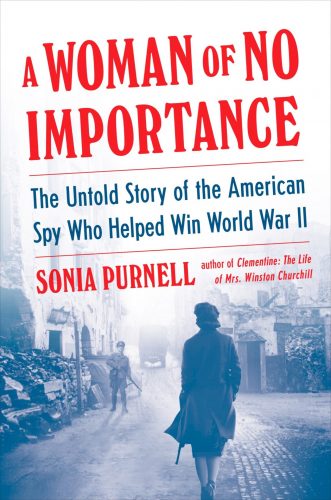
Sonia Purnell’s A Woman of No Importance: The Untold Story of the American Spy Who Helped Win World War II (Viking/Penguin) has won the 2020 Plutarch Award for the Best Biography of 2019.
The Plutarch is the world’s only literary award given to biographers by biographers. Named after the famous Greek writer, BIO awards the honor to the best biography of the year, chosen by a committee of five distinguished biographers. The award comes with a $1,000 honorarium.
Caroline Fraser, Plutarch Award Committee Chair, stated, “The life of an obscure figure, Virginia Hall, rose to the top of the Plutarch list this year in Sonia Purnell’s remarkable feat of research and storytelling. Combing Resistance files in Lyon and archives in London, Paris, and Washington, DC, Purnell retraced Hall’s well-concealed life, revealing the extreme perils and betrayals she faced, including the misogyny of handlers who nearly got her killed. Vulnerable, reckless, and ruthless, Hall emerges as a character of great complexity: an American woman who survived behind enemy lines in Nazi-occupied France with a wooden leg and a questionable French accent, setting up spy networks for Churchill’s government and refusing to evacuate as the Gestapo closed in. With the propulsive power of an espionage thriller, A Woman of No Importance sheds new light on the role of women in warfare.”
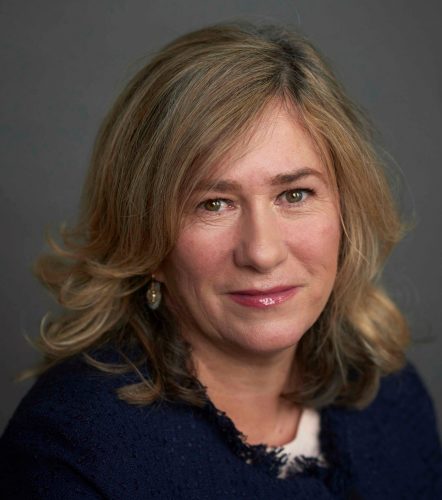
Photo by Charlie Hopkinson
Sonia Purnell is a biographer and journalist who has worked at The Economist, The Telegraph, and The Sunday Times. Her previous book, Clementine: The Life of Mrs. Winston Churchill, was chosen as Book of the Year by The Telegraph and The Independent and was a finalist for the 2019 Plutarch. NPR chose A Woman of No Importance as their Best Book of the Year, and film rights have been sold to Paramount.
Purnell responded to news of her win, saying: “Virginia Hall was a hero in the true sense of the word, and I am thrilled beyond words to receive the Plutarch Award as a tribute to her legacy. I see myself as the lucky one who got to tell her story. She didn’t always make it easy, but we got there in the end! Thank you for this incredible honor, which is a treasure to me.”
In addition to Caroline Fraser, members of the 2020 Plutarch Award Committee are Peniel E. Joseph, Hans Renders, John Richetti, and Susan Ware. The Plutarch Award Committee originally chose ten semi-finalists before selecting five finalists for the 2020 prize. You can see all of this year’s finalists and the long list here.
Jay Prosser Wins Hazel Rowley Prize
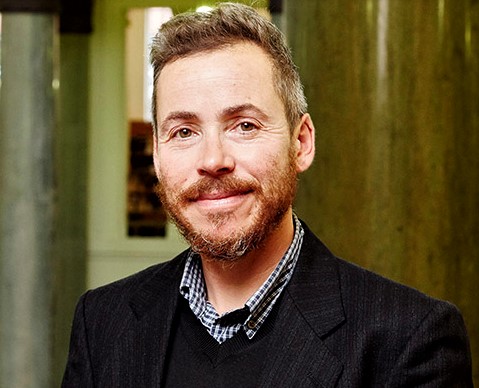 Jay Prosser is the 2020 winner of BIO’s Hazel Rowley Prize for his proposal for Empire’s Loving Strangers: Journeys Through an Asian-Jewish Camphorwood Chest, a biography that explores one Jewish family’s experiences and connections across empires and centuries. Prosser is a reader in humanities at the University of Leeds in England, where he has taught since 1999. His book was previously shortlisted for the Tony Lothian Prize for the best unpublished biography, which is given by the Biographer’s Club.
Jay Prosser is the 2020 winner of BIO’s Hazel Rowley Prize for his proposal for Empire’s Loving Strangers: Journeys Through an Asian-Jewish Camphorwood Chest, a biography that explores one Jewish family’s experiences and connections across empires and centuries. Prosser is a reader in humanities at the University of Leeds in England, where he has taught since 1999. His book was previously shortlisted for the Tony Lothian Prize for the best unpublished biography, which is given by the Biographer’s Club.
The Rowley Prize, worth $2,000, goes to a first-time biographer and also includes a careful reading from an established agent; a year’s membership in BIO and registration to the annual conference; and publicity for the author and project. The prize is a way for BIO—an organization of biographers, agents, editors, and biography devotees—to advance its mission and extend its reach to talented new practitioners.
BIO gives the prize in memory of Hazel Rowley (1951–2011), born in London, educated in England and Australia, and a longtime resident of the United States. A BIO enthusiast from its inception, Rowley understood the need for biographers to help and support one another. Before her untimely death, she had written four acclaimed biographies. Rowley was a passionate advocate for the art and craft of biography, a writer of exacting standards, and a generous friend to fellow biographers.
Carla Kaplan, chair of the 2020 Hazel Rowley Prize Committee, interviewed Prosser about his project via email, which you can see here.
BIO Announces Winners of Caro Fellowships
BIO’s Robert and Ina Caro Research/Travel Fellowship Committee (Deirdre David, Marc Leepson, and Steve Paul) is pleased to announce the selection of the 2020 winners: Lance Richardson and Lynne Bermont.

Lance Richardson
Richardson, who lives in Austin, Texas, is working on True Nature: The Pilgrimage of Peter Matthiessen (under contract to Knopf/Pantheon [US] and Chatto & Windus [UK]). The $2,500 award will enable him to travel to Dolpo, in remote Nepal, the landscape that inspired Mattheissen’s best-known work, The Snow Leopard. In September, Lance will be trekking in Nepal for 21 days.
Richardson is a freelance journalist and in 2018 published House of Nutter: The Rebel Tailor of Savile Row (Chatto & Windus), a narrative that charts the lives of two brothers—Tommy and David Nutter—from austerity Britain through the Swinging Sixties.
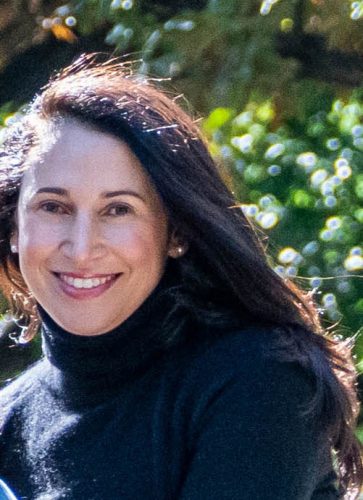
Lynne Bermont
Bermont, who lives in New York City, is working on beginning chapters for a biography of Dina Vierny, a French member of the Resistance who led artists, writers, and intellectuals at night through paths in the Pyrenees. After the war, she established a Paris gallery, a Left Bank bookstore, and furthered the careers of many important artists. The $2,500 award will allow Bermont to travel to Paris to explore the sense of place in Vierny’s life.
Bermont teaches French at Mercy College in Dobbs Ferry, New York, and also conducts guided talks on French writers and painters in Paris museums for graduate students.
You can learn more about the Caro Research/Travel Fellowship here.
Mayborn/BIO Fellow Looks at Two Subjects, Two Cultures
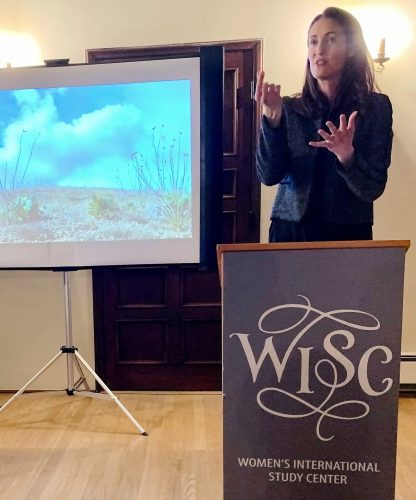 Working on a dual biography of a relative who crossed paths with the Chiricahua Apache chief Geronimo, Morgan Voeltz has faced several challenges. She has also come to a conclusion that is probably familiar to many biographers: “Neither of these characters is entirely a hero,” she said, “and neither is entirely a villain.”
Working on a dual biography of a relative who crossed paths with the Chiricahua Apache chief Geronimo, Morgan Voeltz has faced several challenges. She has also come to a conclusion that is probably familiar to many biographers: “Neither of these characters is entirely a hero,” she said, “and neither is entirely a villain.”
Voeltz spoke about her experience working on the biography (her first), at a talk on February 20, at the Women’s International Study Center (WISC) in Santa Fe. The event culminated her two-week stay in New Mexico as the Mayborn/BIO Biography Fellow. The fellowship was initiated by BIO co-founder James McGrath Morris nine years go. (The fellowship is being restructured for next year; you can read about that here.)
While all the Mayborn/BIO fellows have benefited from the chance to put aside daily demands and devote time to researching and writing (and to receive mentoring from Morris), Voeltz found her New Mexico stay especially helpful. During her residency at WISC, she met with some of the Southwest historians whose works she had already read, contacted Apache sources, explored the region’s topography, and saw artifacts from Geronimo’s time. Meeting with a representative of the Mescalero Apache tribe, Voeltz could ask a key question: “What should I know, what should I understand, if I want to write about this culture that is not my own?”
Finding a Focus
The impetus for exploring the intersection of the lives of Geronimo and Voeltz’s great-grandfather, Captain Henry Lawton, came from Voeltz’s grandmother. She suggested that Lawton’s life was worth researching and writing about. A native of Indiana, Lawton joined the army at 18 and fought in the Civil War, the Indian Wars of the West, and the Philippine-American War of 1898. He died in combat during that latter conflict. Voeltz began examining her relative’s life while working on an M.A. in nonfiction writing at Johns Hopkins University. She was struck by how “his life crossed paths with some really formative events for U.S. history during that entire era of the late 1800s.”
Her literary agent convinced Voeltz that instead of giving Lawton’s life a cradle-to-grave treatment, she should focus on one part of his life: the manhunt Lawton led to track down and arrest Geronimo and his Apache followers. But for Voeltz, the story is more than an adventure tale that follows the two men across the Southwest and into Mexico. She also wants to explore the two cultures at play. “Lawton and Geronimo come into the situation with completely different realities,” Voeltz said. “And I want readers to feel that.”
Part of Geronimo’s reality was growing up in the Gila Mountains of southwest New Mexico. That’s where he learned the survival skills that would help him elude capture for some four months in 1886, as Lawton and his men pursued the Apaches over mountainous desert terrain. For Lawton, a motivation in his life was uniting and then protecting the Union he loved.
Shared Traits
During her research, Voeltz learned that her great-grandfather and Geronimo had, as she put it, “a number of commonalities at a very deep human level.” Both chose the warrior life and saw violent conflict at an early age—Lawton during the Civil War and Geronimo while taking part on raids. Both became respected leaders because of their military skill (while Geronimo’s status was bolstered by his role as a medicine man). Lawton and the Apache chief also had strong family and community ties.
Finally, Voeltz said, both men “experienced profound loss in their lives, the kind of loss that knocks you loose from your foundation.” Each lost a parent before the age of 10, and each lost their first three children. Despite those losses, Lawton and Geronimo also had great physical and psychological resilience. Voeltz said the chase through the mountains—the backbone of her story—“puts both of their physical resilience to the test, as well as their emotional resilience.”
Challenges and Conundrums
Finding the sources to give each subject’s perspectives and experience equal weight has presented Voeltz with some challenges. It’s much easier for Lawton’s side, as his letters to his wife are in the Library of Congress. They give Voeltz insight into his character as well as details about life on the trail. But for Geronimo’s side of the tale, there are no written sources from his time when he was trying to evade Lawton. Voeltz is trying to piece together things by knowing how the Apaches lived and traveled in the region at that time. In one example, she noted how Geronimo had been given tips when he was a boy on how to survive in a hostile environment—tips that likely came into play in 1886.
For the Apache side, Voeltz has also turned to accounts left by Apache scouts who traveled with Lawton and his men, though they were recorded years later, as told to white men. Geronimo, likewise, dictated an autobiography later in life to a white notetaker. Voeltz also relies on Apache oral histories, including some from men who lived with Geronimo after his capture.
Voeltz is also considering the language she uses. Geronimo has often been described as a renegade, but is that the proper word, she wonders: “Can you really be a renegade if you’re traveling through a region that you perceive to be your own land?” And Voeltz has tried to find the proper description for Geronimo and his men, and has ended up using Apaches, Indians, and Native Americans interchangeably.
Perhaps her biggest conundrum, Voeltz said, is how to grapple with issues of privacy and taboo. She said, “To the Apache, one does not speak someone’s name after that person has died. My book is full of the names of people who died. How do I navigate this?” Along with that, she is wrestling with how to do justice to Geronimo’s world view, one that included his belief that he could communicate with the elements and stop time.
Voeltz will continue to sort out these and other concerns as she works on her book. In the meantime, her fellowship in New Mexico has prepared her for the next phase of research and writing, even as she juggles a full-time job and raising a family. After the fellowship, she said, “the pump is primed.”
